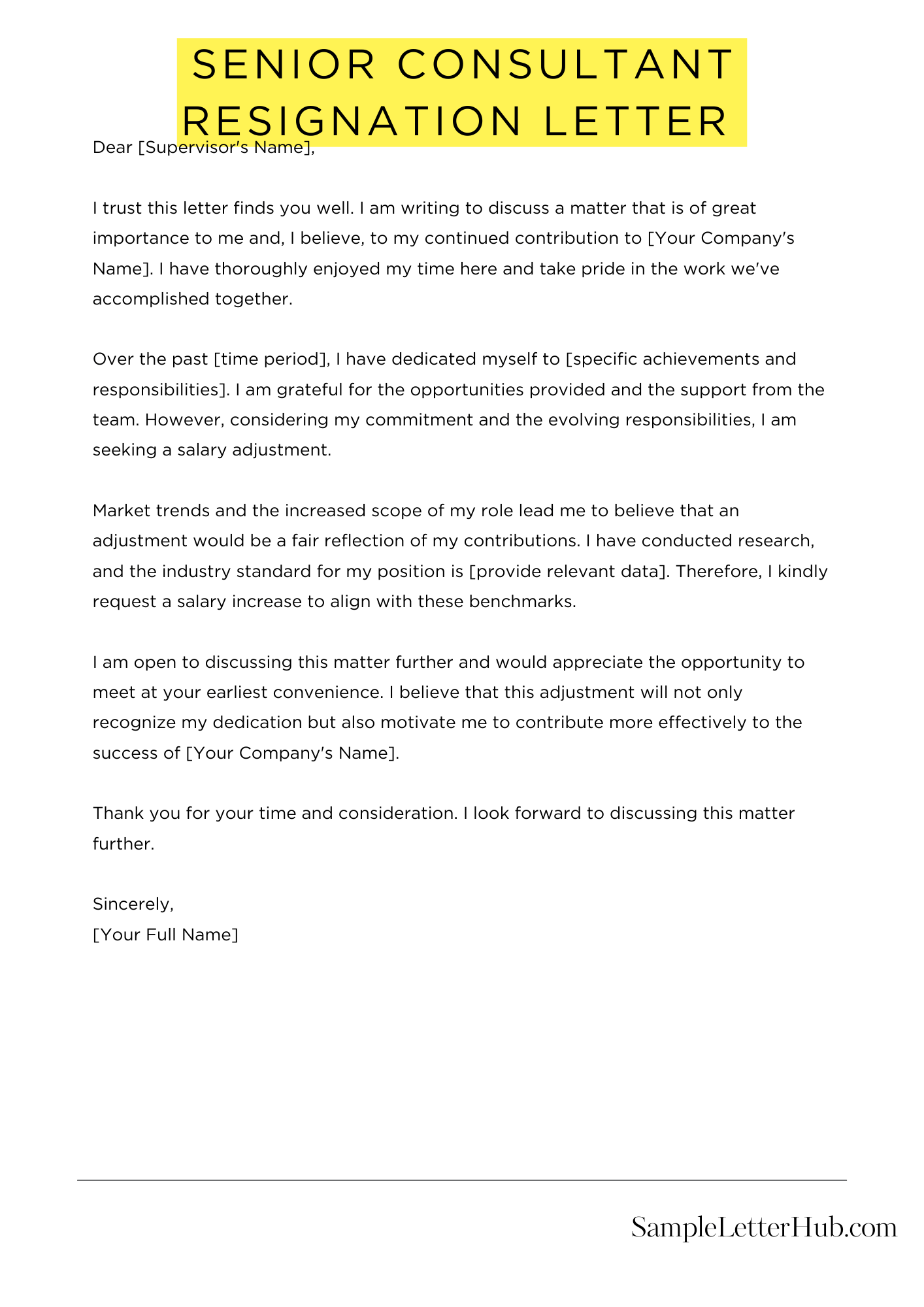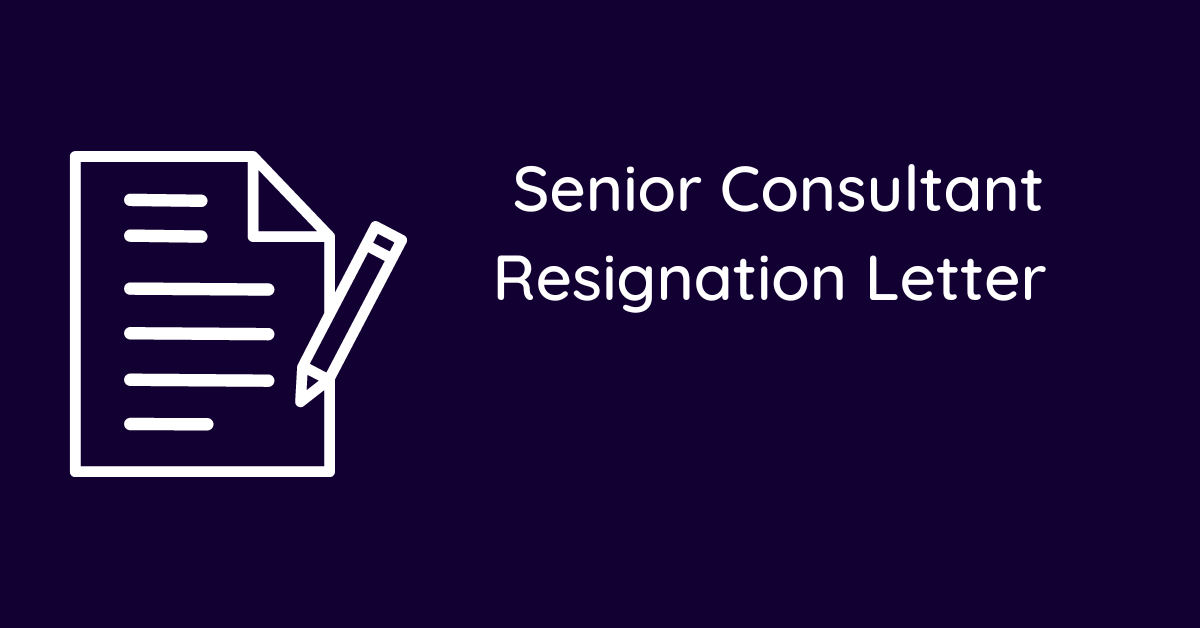When it comes to transitioning out of your role as a senior consultant, crafting a well-written resignation letter is paramount. In this article, we’ll provide you with a comprehensive guide to writing a senior consultant resignation letter, along with a sample template to help you get started.
A well-crafted resignation letter should convey your decision to leave the company in a clear and professional manner. Remember to maintain a polite and humble tone throughout your letter, expressing gratitude for the opportunities you’ve been given. Be mindful of the company’s policies and procedures regarding resignation timelines and any necessary handover processes.
Below, you’ll find a sample senior consultant resignation letter template that you can adapt to your specific situation. This template provides a framework for expressing your appreciation, stating your departure date, and offering to assist with the transition. Remember, your resignation letter is an opportunity to leave a positive and lasting impression, so take the time to craft a thoughtful and professional document.
Senior Consultant Resignation Letter
Dear [Recipient Name],
Please accept this letter as formal notification that I will be resigning from my position as Senior Consultant at [Company Name], effective [Last Date of Employment].
I have enjoyed my time at [Company Name] and am grateful for the opportunities and experiences I have gained during my tenure. I have learned a great deal and have had the privilege of working with a talented and dedicated team.
I wish you and [Company Name] all the best in the future.
Sincerely,
[Your Signature]
Short Senior Consultant Resignation Letter Sample
Please accept this letter as formal notification that I am resigning from my position as Senior Consultant at [Company Name]. My last day of employment will be [Your Last Day]. Thank you for the opportunity to grow and learn during my time here. I wish you and the company continued success. I am happy to assist in the transition process to ensure a smooth handover of my responsibilities.
I wish you all the best with your senior consultant resignation letter.
When it’s time to say farewell, expressing your gratitude and best wishes can make the transition smoother:

How to Write a Senior Consultant Resignation Letter
1. Start with a Formal Opening
Begin your letter with a formal salutation, such as “Dear [Manager’s Name].” State your intention to resign from your position as a Senior Consultant, clearly indicating your last date of employment.
2. Express Gratitude and Appreciation
Take this opportunity to express your sincere gratitude for the opportunities and experiences you’ve gained during your tenure. Highlight specific projects or initiatives that you’re particularly proud of and acknowledge the support and guidance you’ve received.
3. State Your Reasons (Optional)
While it’s not mandatory, you may choose to briefly state your reasons for leaving. Be professional and concise, focusing on positive aspects such as seeking new challenges or pursuing personal growth. Avoid negative or critical remarks.
4. Offer Assistance with the Transition
Demonstrate your commitment to a smooth transition by offering to assist in any way possible. This could include providing training to your replacement, documenting processes, or sharing insights.
5. Close with a Professional Tone
End your letter with a formal closing, such as “Sincerely,” followed by your typed name. You may also include a handwritten signature if you’re submitting a hard copy.
6 Most Frequently Asked Questions About Senior Consultant Resignation Letters
Senior consultants play a pivotal role in guiding organizations through complex challenges and driving growth. When it comes to crafting a resignation letter, it’s essential to approach the task with professionalism and clarity. Here are six frequently asked questions and answers to help you navigate this process effectively:
1. What is the appropriate notice period for a senior consultant?
The standard notice period for a senior consultant is typically two to four weeks. However, it’s advisable to check your employment contract or company policy for specific requirements. Providing ample notice allows for a smooth transition and ensures a positive relationship with your employer.
2. How should I structure my resignation letter?
A well-structured resignation letter should include the following elements:
- Your name, address, contact information, and the date
- Clearly state your intention to resign from your position as a senior consultant
- Express your gratitude for the opportunity and highlight your key accomplishments
- Briefly explain your reasons for leaving, if desired
- Indicate your willingness to help with the transition process
- Thank your employer again and wish them well
3. What tone should I use in my resignation letter?
Maintain a professional and respectful tone throughout your letter. Express your appreciation for the experience and opportunities you’ve gained. Avoid being negative or critical, and focus on the positive aspects of your time with the company.
4. Should I offer to train my replacement?
Offering to train your replacement demonstrates your commitment to ensuring a smooth transition. It’s a thoughtful gesture that can leave a lasting positive impression.
5. What if I’m leaving on good terms but have concerns about the company?
If you have concerns about the company’s direction or practices, it’s important to address them in a constructive and professional manner. Consider scheduling a meeting with your manager to discuss your concerns before submitting your resignation letter.
6. How can I ensure a positive transition after I leave?
- Provide clear documentation of your projects and responsibilities
- Offer to assist with training and knowledge transfer
- Maintain a positive and collaborative attitude
- Stay in touch with your former colleagues and clients
Before making the decision to resign from your job, it’s essential to consider the legal aspects:
Understanding your emotions after quitting your job is important. Explore why you might be feeling sad:
Related
- Resignation letter sample
- Forced resignation letter
- Resignation letter due to going abroad
- Resignation letter due to marriage
- Resignation letter due to other opportunity
- Resignation letter due to mistake

